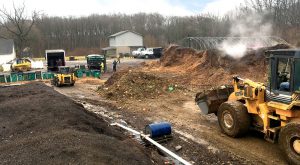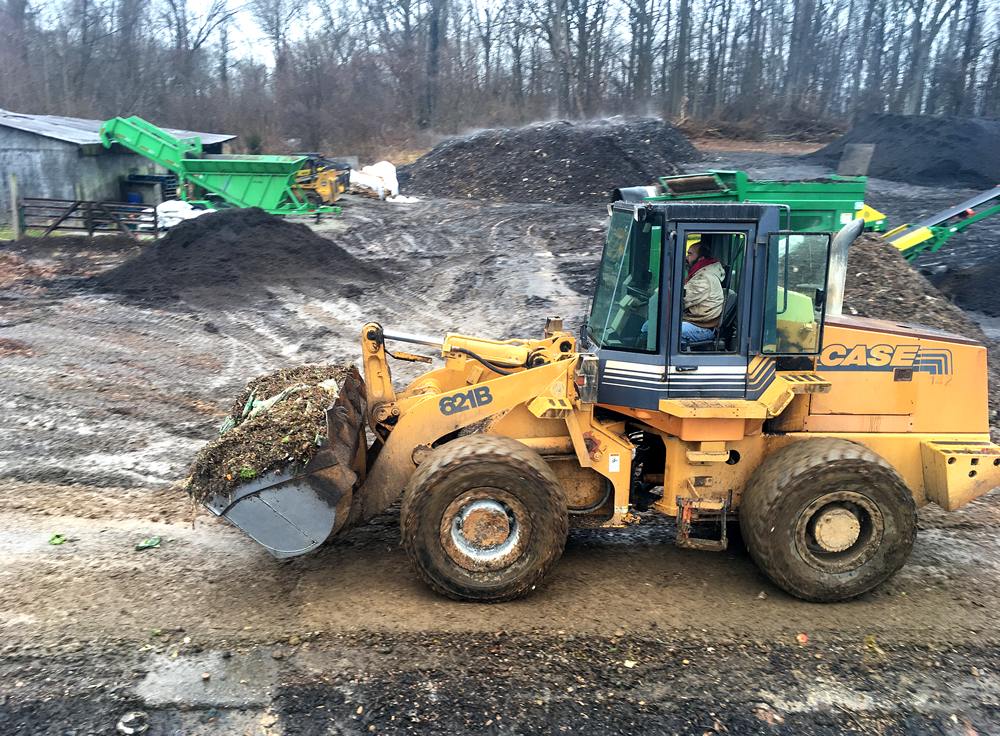Compost manufacturer collects commercial and residential food waste in the Baltimore and Washington, D.C. metro areas.
Nora Goldstein

Veteran Compost in Aberdeen is building a new active composting pad on compacted asphalt millings. The tipping pad, screening area and a central aisle that runs down the middle of the active composting and curing piles are on concrete. Image courtesy of Veteran Compost
It all started when Justen Garrity looked at a pie chart of how U.S. solid waste was managed. Garrity, an Army officer, had returned home from the war in Iraq in 2009, and was having difficulty finding a job. He decided to take matters into his own hands, and start a green enterprise. “I looked at a pie chart of municipal solid waste generated in the U.S. and saw that two-thirds of the pie is compostable,” Garrity told BioCycle in 2013. “Composting seemed like a huge opportunity, with a big demand for the products on the back end. It made sense from both a sustainability perspective and a money-making enterprise.”

Justen Garrity
He named the business Veteran Compost (and focuses on hiring veterans) and opened in July 2010 on a leased 80-acre property in Aberdeen, Maryland, that includes 30 acres of farmland. The original composting site was built on two acres and utilizes the extended aerated static pile (EASP) composting method. Collection of food scraps has been part of the business model from the outset. At the time of our profile in 2013, Veteran Compost was collecting about 15 tons/week of food waste from schools, hospitals, supermarkets and restaurants.
Fast forward to 2020. “Things are going well,” said Garrity when we spoke in January, “other than a shortage of labor. We have around 25 full-time employees and could probably double that.” Veteran Compost has increased wages, added a 401k retirement plan and dental insurance. “There is a complete paucity of unskilled labor in this part of the country,” he notes.
The company uses totes for collection, servicing commercial customers in the Baltimore and Washington, D.C. regions. Full totes are swapped out for clean ones; box trucks and stake body trucks equipped with a hydraulic lift gate are used for transporting the totes, which are washed out at the composting site. All food scraps, as well as compostable PLA (polylactic acid) serviceware, waxed corrugated and food-soiled paper, are accepted. Veteran Compost also offers residential food scraps collection in the DC Metro area, providing 7- or 14-gallon bins and collecting them weekly.

Food scraps are mixed with wood chip fines and composted in extended aerated static piles.The site is being regraded, and a new water collection system is being installed. Image courtesy of Veteran Compost
“We compost about 20 tons/day of food waste, 5 to 6 days a week at our Aberdeen site,” says Garrity, adding that in 2019, a total of 5,000 tons of food waste were composted there. “Veteran Compost has a second facility in Fairfax, Virginia, where we compost a couple tons a day, including residential food waste. And we are still trying to finish permitting our facility in Lothian, Maryland, which we’ve built on top of a closed landfill. We have all the state permits, but are hung up at the county level with zoning and planning.” (The Lothian site also has a manure and food waste composting demonstration and public education/training facility that was funded by a Maryland Department of Agriculture grant.)
Veteran Compost accepts material at its Aberdeen site from outside haulers, receiving dumpster or tractor trailer loads of industrial and commercial food waste, including hops, food manufacturing waste and unedible food from distribution centers. “We are wary of compactors,” notes Garrity. “Too many unwanted items can lurk in there!”
Confident In Compostable Products
Garrity decided when he launched Veteran Compost that he would accept BPI-certified compostable products, including food serviceware and, when requested by clients, compostable cart liner bags. It has always collected organics from special events, music venues, seafood festivals and similar gatherings and encourages use of either chinaware or compostable wares to minimize trash and maximize diversion to composting.
“Our clients and our company support use of certified compostable products, which is important to state at this time when environmentalists and some composting facility operators are ‘sharp-shooting’ them as not being green enough, or being the cause of contamination in food waste loads,” explains Garrity. “We support all these businesses that were convinced to switch from single-use plastics to compostable alternatives. Veteran Compost is not going to run away from them. The industry is working through challenges — such as PFAS and better labeling — toward solutions.”
He adds that the products themselves, such as compostable utensils, have improved in terms of disintegrating during the composting process. “As long as we start out with a good mix and good moisture content, we see little evidence of compostable products at the end of our active composting phase, which is about 28 days,” he says. “One practice we adopted very early on is to open and empty all bags of organics that we receive. We don’t typically use compostable liners in our collections, but when we do, we cut or rip them open to make sure all the contents are emptied out, and that there isn’t any trash in the bag. In addition, it takes longer for material to break down when it’s compacted inside a bag. In the aerated static pile process we want a homogenous mix, so we don’t want pockets of material like unopened bags.”

Winter composting at Veteran Compost: Fresh food waste, fresh snow. Image courtesy of Veteran Compost
Composting Process
Veteran Compost is upgrading its site in Aberdeen, building a new active composting pad on compacted asphalt millings. The tipping pad, screening area and a central aisle that runs down the middle of the active composting and curing piles are now on concrete. The site is being regraded, and a new water collection system is being installed.
From day one, Veteran Compost has used only wood chip fines that it purchases from a wood recycler, or arbor chips from tree companies, as a bulking agent. “The mulch fines have proven to be a good, clean, reliable source of consistent woody carbon material,” explains Garrity. “It allows us to avoid the huge cost of a grinder. In addition, the mulch fines are on the dry side, so we are very motivated to capture all the liquid that comes in with the food scraps. It also minimizes our risk for persistent herbicide issues, since we don’t handle manure or yard debris at either our Aberdeen or Fairfax sites, although our third site in Lothian will handle manure.”
The extended EASPs are about 50-feet wide, 8- to 9-feet tall and a couple hundred feet in length. The tipping pad is cleared each day, with new material added to the end of an EASP, and covered with composted overs. “One to two times per week, we cover that daily cover with the mulch fines as a second level of encapsulation and cover,” says Garrity. “Visually, the piles look much nicer than if we kept covering them with overs that may have large chunks of stuff. We negotiated a pretty good price with the manufacturer for the fines. They also are effective for odor and fly control.”
After active composting, material is screened and put in curing piles with no aeration. The minimal curing time is 2 months, although Veteran Compost strives for 3 months. “The longer the compost sits the better,” he adds.
The largest compost market, in terms of yards moved, is the agricultural sector, which includes farms, urban agriculture and community gardens. The company doesn’t sell much compost into the landscaping and erosion control markets as that demand is filled by municipal yard trimmings compost. “Our most profitable market is direct to consumers, whether in bags or bulk,” notes Garrity. “We also have a commercial vermicomposting operation, which helps diversify our product line. In 2020, we are pushing more retail sales, and are introducing some new mixes.”
Veteran Compost uses “breathable” sand bags for its bagged products. “I don’t feel good about selling compost in a plastic bag that will just be thrown away,” he says. “And it’s good to allow the compost to breathe. Some customers return the bags to us, which we then reuse.”









